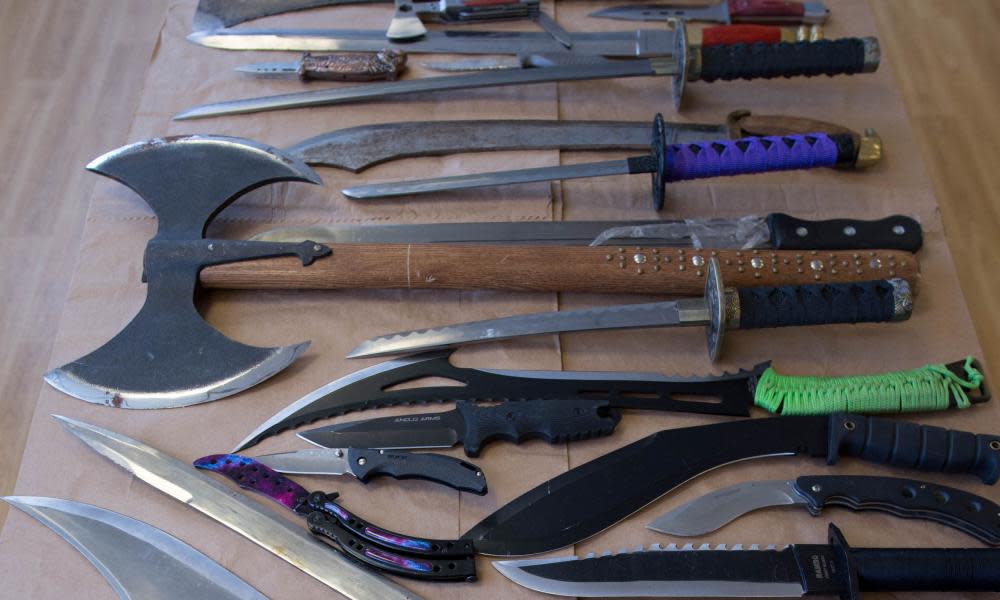Almost a quarter of shops 'illegally sell knives to underage people'

Nearly one in four shops is breaking the law on under-age knife sales, with blades sold to children as young as 12, trading standards officers have warned.
In test purchases carried out for the Local Government Association, implements including a machete, a nine-inch serrated knife, razor blades and craft knives were sold to underage teenagers across England and Wales. Major supermarket chains were among the offenders.
The results, which the LGA said were alarming, follow widespread concern at police-recorded crime figures, which found a 20% rise in knife offences to 34,703 incidents - the highest level in seven years.
Responding to the new crime figures, the head of parliament’s youth violence commission said that 2017 could be a new low point for knife deaths in the UK, calling for an “urgent, united and societal response” to the problem.
“Indications so far suggest that knife crime and knife-related deaths will be much higher in 2017 than in previous years,” said Labour MP Vicky Foxcroft, who established the commission last year after a spate of killings of young people in her Lewisham constituency in south-east London.
Foxcroft suggested that the number of incidents was likely to be higher because many people who went to hospital with stab wounds did not go to the police. “We need to have much more accurate reporting.” she said.
This year the Guardian has launched Beyond the Blade, a reporting project that will mark the deaths of children and teenagers in the UK who are killed by knives in 2017. There is no publicly available national data on the number of victims in this age group.
Foxcroft’s intervention was echoed by Simon Blackburn, chair of the LGA Safer and Stronger Communities Board, who said the trading standard tests demonstrated “shocking abuses of the law” by retailers across the country. The LGA called for greater fines and tougher sentences for shop owners who break the law banning the sale of knives to people under 18.
In test purchases in one area alone, one teenager was sold a machete, another a lock knife and a third a nine-inch serrated knife.
In London, where knives have been behind a spate of murders, 96 out of 725 test purchases carried out saw knives and blades sold to children as young as 13 including a national supermarket chain.
One 16-year-old bought a pack of craft knives from a major high street store without being asked for proof of age at the self-service checkout. In another instance, a 17-year-old police cadet bought a pack of double edge razor blades from a supermarket chain self-service point.
That picture was not confined to the capital. In purchases undertaken by Devon, Somerset and Torbay Trading Standards in cooperation with police, seven out of 29 shops - including two major supermarkets - sold knives to under 18s.
At one shop in Bristol, a 14-year-old girl was sold a nine-inch serrated knife. Afterwards she commented: “It’s scary how easy it is to buy a knife.”
Blackburn said knife crime had risen significantly last year and people accessed knives from different places but it was “important to make sure the retail supply of knives is managed robustly across all sales points”.
He added: “Knives are lethal weapons in the wrong hands and it’s vital that shops do all they can to prevent them falling into the hands of young people.”
In London, 19 traders were prosecuted or have cases pending. Others received official warnings or provided with compliance advice. Trading standard officers warn that cuts to frontline staff and funding have made enforcing knife sale laws increasingly difficult.
Foxcroft said that the level of knife crime revealed by the police-recorded figures could underplay the real picture, suggesting that the number of incidents is likely to be higher as many people who attend hospital with stab wounds do not go to the police.
“We need to have much more accurate reporting,” she said. Pointing to the death of four teenagers in a week just before the election, she said: “Now, more than ever, we need an urgent, united and societal response to tackle the epidemic of violence affecting young people across the country.”
Foxcroft welcomed proposed new anti-knife crime measures including banning the delivery of knives to private addresses and police powers to confiscate banned weapons found in people’s homes. However, she said they failed to go far enough.
Improved retail display of knives was important, she said. “The commission spoke to lots of different people. One of the things they said was in terms of them being so freely available, on display in shop counters. If a kid is willing to use or carry a knife, are they going to think anything of stealing one? Should [the knives] be behind counters, locked up?”
The four young people killed in nine days as the election campaign drew to a close were Matthew Cassidy, 19, in Deeside, north Wales; Abdirahman Mohamed, 17, in Peckham, south London; Koy Bentley, 15, in Watford, Hertfordshire; and Osman Sharif, 17, in Tottenham, north London.
Since the four deaths, another 18-year old, Mahad Ali, was killed following a party in Park Royal, west London on June 29. Mahad was stabbed several times in the chest by a number of attackers. Three men were arrested after his death. Two have been released and third is on police bail.
Together, the deaths bring the count of children and teenagers killed this year by violence involving knives to 21.

 Yahoo News
Yahoo News 
